| Construction Rating: | starstarstarstarstar_border |
| Flight Rating: | starstarstarstarstar |
| Overall Rating: | starstarstarstarstar |
| Manufacturer: | Centuri |
| Style: | Scale-Like |
Brief:
I used to have a Centuri Nomad as part of my original fleet in the late 70s-early 80s. It was mounted on a simulated
Navy double launch rack that I also scratch build. I lost track of all the rockets once I left for college and were
never to be found. (I think my sisters trashed them while I was gone...) All of them are OOP at this point so I am
cloning/scratchbuilding them.
The Nomad is a single-stage, 18mm motor, parachute recovery, scale-like rocket from Centuri. According to Ninfinger's webpage, it first appeared in the Centuri 1973 catalog and it was last seen in the Centuri 1980 catalog. It was originally marketed with die-cut fiber fins and chrome band stickers.
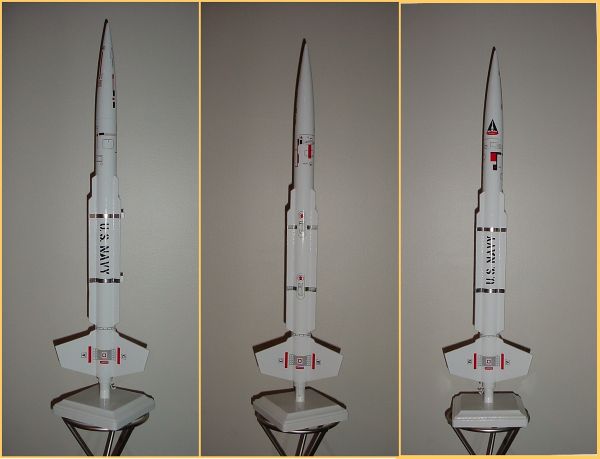
Construction:
All parts were supplied by SEMROC except for the parachute, Kevlar®,
shock cord, and fin stock.
Parts List:
- Body Tube ST-10180 cut to 13"
- Nose Cone BC-1050
- Eye Screw
- Engine Mount:
- Engine Mount BT ST-730, 3"
- Engine Block TR-7
- Engine Hook Standard 2.75"
- 2 Centering Rings CR-710
- Fin Stock, 3/32" Balsa
- Tether 100lb Kevlar®, 20"
- Shock Cord, 1/8" Cotton Elastic 18"
- Parachute, 16" home made
The motor mount was pretty much a straightforward build. I installed the engine hook so that the engine would hang about 0.5" past the MMT then I installed an engine block. Glued one of the centering rings at 1.0" from the rear end of the MMT and the second centering ring right at the end of the engine hook. Once it was dried I tied one end of the Kevlar® shock cord around the MM between the centering rings and carved a small "V-shaped" section on the last centering ring to accommodate the Kevlar® chord between the centering ring and the BT once installed.
After cutting the fins, the vanes, and the launch lugs, I marked the BT according the instructions and used the Estes plastic Tube Marking Guide to extend the lines along the BT. Now, here is where I deviated from the normal "gluing the fins to the BT" procedure and use a technique I came up with: I lightly sanded towards the right side of the recently drawn lines where the fins and vanes were to be glued to ensure a better grip, I made sure I did not "sand off" the lines. Then I glued the fins and vanes on the right side of the lines (over where I just sanded) using the lines as a guide and making sure the fins and vanes were straight. This is the first time I have done this and it worked like a charm. I used the "double glue joint" technique to glue the fins to the BT with Titebond II wood glue. After all glue joints were dry I did one pass of yellow glue for fillets.
Finishing:
I slightly watered down some Elmer's Wood Filler. Working on one surface at a time, I covered the entire surface of
the fin with EWF, and then I used an old credit card to slowly scrape off the excess filler, leaving behind a smooth
surface. I worked this way on each balsa surface. Once the first coat was dried, I repeated the process all over again.
After one hour I sanded the fins with 220 and 400 grit sand paper for a smooth finish. Now she was ready for primer.
I used Krylon White Primer as primer and basecoat. Gave it two light coats of primer and sanded some after it was dried. Gave it another two light coats and once sanded, rubbed the finish with microfiber to a satin finish. I waited three days for the last coats of primer to dry. Once the primer coat was dry, I gave it two light coats of the old Krylon Gloss White waiting about 15-20 minutes between coats. Then a third "wet coat" was applied and hung it in my garage to dry for three more days.
I got the decals from Gordon at Excelsior Rocketry. The decals are excellent quality and the colors are rich and deep. Gave the entire decal sheet a coat of Microscale Liquid Decal Film and set them aside it to dry.
The decals did not come with the chrome stripes so I decided to print them myself with my ALPS printer using Silver Foil. I printed two 7" x 0.5" long stripes of the Silver Foil and ran the Photo Gloss Finish over the stripes. I gently, and I mean, gently applied a very thin coat of Liquid Decal Film using a dense foam brush. Once dry, I applied a second coat. The foil is very fragile and sensitive to the LDF, so sometimes the LDF will lift the edges of the print off the decal paper, which is the reason why I printed the stripes that wide. Using a fresh, sharp X-Acto knife, I trimmed the stripes to measure 0.25" wide by 5" long. The stripes should be at least 5.25" long so they can cover from one side of the launch lug stand to the other. You can later trim the excess.
I mixed about 3/4 cups of water with four drops of liquid dishwasher soap into a small bowl and used it to dip the decals and to prep the surface of the decal area. I used the Micro on recently decaled rockets but had some difficulties with the decals sticking to the surface too quickly. The extra soap on the water allowed me extra time to accommodate the decals on the rocket. Once done applying the decals, I waited 24 hours before I applied one coat of Future wax to protect the decals and for that extra shine.
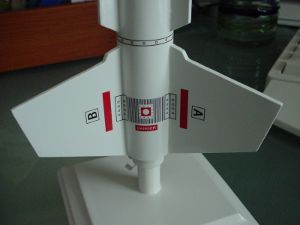
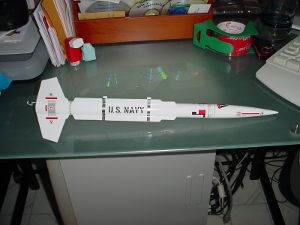
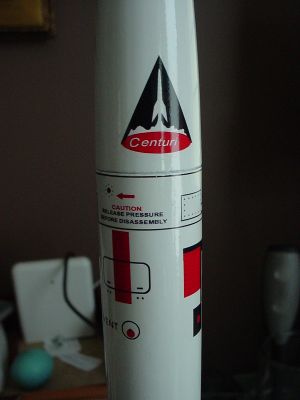
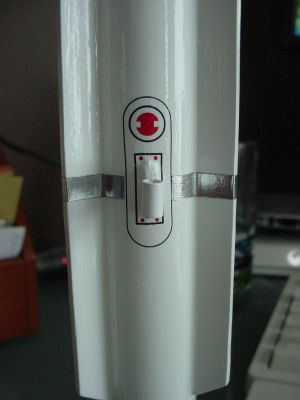
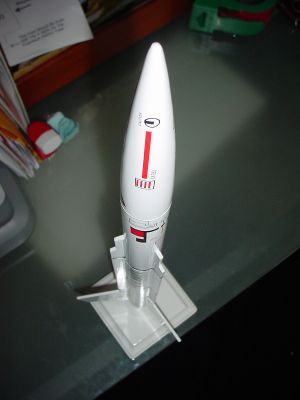
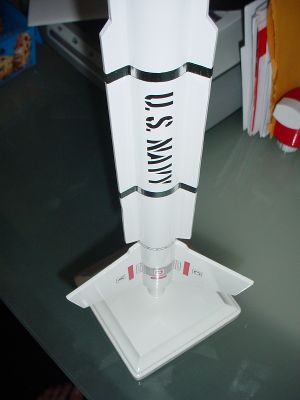
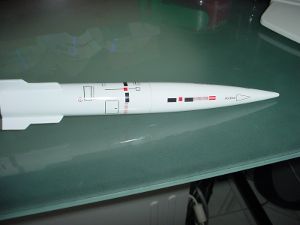
Construction Rating: 4 out of 5
Flight and Recovery:
I had the opportunity to fly the Nomad for the first time while participating in a local Boy Scout Rocket Demo on 26
June 2009 under the auspices of our local rocket club, NARHAMS. The launch site was in the soccer field of the
Dundalk's Chesterwood Park. Since it was a small field I chose to fly the Nomad with an A8-3. Packed 4 sheets of
wadding, installed the igniter, and placed it on the launching pad.
It was a slow lift off but a straight one, reaching about 150-175 feet. Chute deployment was right on apogee and it landed about 75 feet from the pad thanks to almost no wind. One of the Boy Scout recovery team members brought it back safe and without a scratch. After seeing it fly so low I knew that I had to try it with a B6-4 but reconsidered because the field was too small. That opportunity would come at a later date...
Almost three weeks later, on 13 July 2009, I mustered enough courage to fly the rocket at a local baseball field. Afternoon winds were reported to be up to 17 mph but it was barely noticeable, I would say about 5-8 mph. I noticed that the field was surrounded by a heavy concentration of trees except for one side were the basketball court was. I invited a friend that was visiting from out of town to experience rocketry for the first time. Prepped an A8-3 and a B6-4, picked up my field box, and headed to the field. There was no wind in the area so I set the launch pad right in the middle of the field. Prepped the rocket with the A8-3 and set it up on the pad. My friend was about 100 feet away from the rocket in order to see the flight better and to judge how high it would go. Like the first time, it took off the pad slow and straight and reached about 150 feet, chute deployed at apogee, and it landed about 50 feet from the pad without a scratch.
After the second flight I prepped the rocket again but this time I installed the B6-4 and placed the rocket on the pad. I told my friend to go a little farther and to be ready to recover the rocket. This time the rocket took off the pad really quick and straight. It seemed that it was going to climb forever. It peaked at around 500 feet when the chute deployed. The chute did not opened immediately, but once it did, it started drifting towards the tall trees and the basketball court. It kept drifting and it floated over the trees. Lucky for me it landed in the middle of the basketball court, about 200 feet away from the pad. It only suffered a small "battle" scar on the nose cone.
It is a great flier with a B6-4 reaching about 500 feet. It also flies well on an A8-3 but only if you want it to go no higher than 200 feet and in small fields.
Flight Rating: 5 out of 5
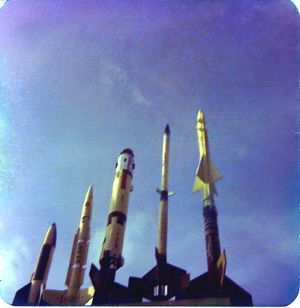
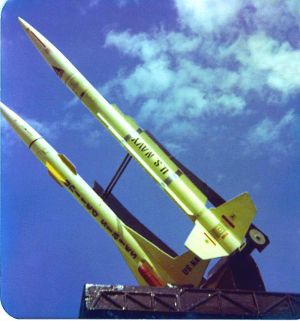
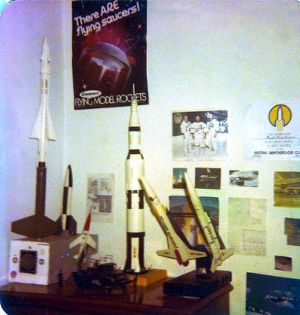
Summary:
PROs: The parts are available through may websites such as Semroc and Balsa Machining, making it easy to gather the
parts for a clone. The instructions are clear and also easy to follow. Straight build is about a Skill level 2 but if
you are going to print your own decals, finish the fins, and apply Future, I would say Skill level 3.
CONs: The lack of good pictures and a clear illustration of where the decals go can contribute to placing the decals in the wrong place. I had the top wrapper decal cut in two sections and applied the bottom half too high so I had to make an adjustment to the upper portion of the decal to accommodate the upper half. Also applying the silver band decal can be time consuming and can be easily messed up: keep the decal wet so that you can make adjustments.
I am very happy with the outcome of this build. It was fun to do the research and building a childhood favorite, bringing back many memories. It was also nice to see how eager are other fellow rocketeers to lend a hand when you ask for help. I have always been a "Centuri fan" and this is one of my all-time childhood favorites. The Nomad has joined the ranks of my "reborn" original rocket fleet, which so far includes the Centuri V-2 and the EAC Viper (almost finished). All I have left to clone are the Centuri Excalibur 2 and F-16 Strike Fighter, the Estes Nike Ajax, and three scratch builds. Next related project: A simulated Navy launch rack to display the Nomad...
Overall Rating: 5 out of 5
 |
 |
Flights
Sponsored Ads
 |
 |











